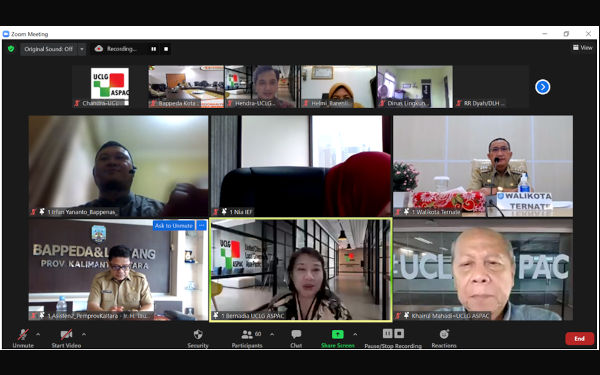Following the examples of ten pilot cities under the Climate Resilient and Inclusive Cities (CRIC) Project funded by the European Union (EU), local governments from other cities in Indonesia are moving towards envisioning a sustainable environment for cities to a greater extent.
It has become evident that local governments stumble upon the challenge of figuring out alternative methods to finance development projects and programmes that contribute to the achievement of the 17 Sustainable Development Goals (SDGs).
The reliance upon the central government is much more likely to prevail with a perception of limited knowledge and access to alternative financing in current conditions of the pandemic. This is mostly due to the fact that quite a significant amount of central and local government budgets are reallocated towards COVID-19 response and mitigation for the past year.
In consequence, the access of alternative financing requires feasibility and creativity for local governments to meet such exposure, which was the main topic of discussion of the webinar organised by UCLG ASPAC on 8th June 2021, titled “Improving Local Government Capacity in Sustainable Environmental Management through Alternative Funding”.
“We cannot depend on conventional financing, particularly during the COVID-19 pandemic,” said Dr. Bernardia Irawati Tjandradewi, the UCLG ASPAC Secretary General during her opening remarks.
Over the course of the exposure to alternative financing that embraces non-state actors, it is noteworthy for local governments to establish international partnerships with long-term vision in mind. Furthermore, that long-term vision must be well-tailored on the basis of a sustainable environment for a well-distributed economy in the area. Taking small steps is, then, preferable for local governments to exercise their creativity without the need of waiting for large funds.
Both the acceleration towards the SDGs and the support of recovery along with economic transformation are, for instance, several steps in the path of green economy and low carbon policies. Mr. Irfan D. Yananto, SE, MERE, the Directorate of Environment of the Ministry of National Development Planning of the Republic of Indonesia (MoNDP) drew attention to disasters as negative economic impacts of climate change.
Ms. Endah Tri Kurniawaty, ME, MPA, the representative from the Indonesian Environment Fund of the Ministry of Environment and Forestry of the Republic of Indonesia (MoEF), shared enthusiasm for the participation of local governments. Due to the substantial role of local governments, she placed lowering greenhouse gas emissions on top of conservation and waste management towards sustainable environment.
A number of non-state actors, such as the Green Climate Fund (GCF), REDD+ Norway, Forest Carbon Partnership Facility (FCPF), Bio Carbon Fund (BCF), World Bank, and Ford Foundation, had incorporated their endeavour as initial fund with the MoeF. “There are many sources of alternative funding,” where she emphasised for local governments to initiate partnerships and catch up with the financing mechanism in terms of bureaucracy for administrative necessities.
During the webinar, a couple of officials from local governments also turned up to present experiences and best practices of alternative financing in each of the cities they had been appointed to work in. An official from the provincial government of North Kalimantan, Ir. H. Taupan, MM, explained the implementing process of sustainable development through alternative financing. He expressed that the environment sector of North Kalimantan placed an emphasis on low-carbon development, and improving the quality of water, air and land in the province’s development goals and objectives for 2021-2026. The strategy includes improving climate change mitigation and adaptation efforts, as well as improving the quality of environmental protection and management.
It had taken more or less ten years of rigorous bureaucracy, formation of partnership with non-state actors (such as WWF, MCA-Indonesia, Konservasi Alam Nusantara and many more) to finally set up a hydroelectric power plant with the amount of 9000 MW around Kayan river.
Meanwhile, the Mayor of Ternate from North Maluku, Dr. M. Tauhid Soleman, M.Si, dwelled on the spirit of gotong royong as a social asset in tackling environmental issues. This is important as Ternate city is prone to earthquakes, floods, landslides. Further issues include availability of clean water, waste accumulation in coastal areas and land, and also coastal abrasion. To give an example, the amplification of a sense of belonging helped for the communities, not only the officials, to partake in keeping up with cleanliness in public places like markets.
In addition to that, he explained that Ternate city also placed an important of partnerships with CSRs, NGOs in financing development projects and optimising Regional Original Income (Pendapatan Asli Daerah) for alternative financing, as well as increasing the capacity of regional owned enterprises (BUMD) to encourage its contribution to the city’s development, especially with regard to climate change.
By KM Team











